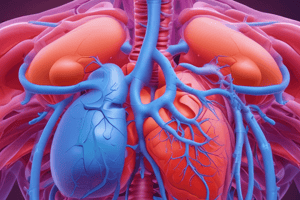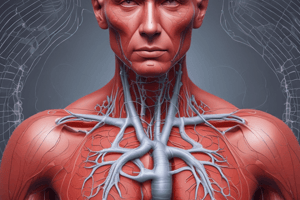Podcast
Questions and Answers
Which system includes the cranium and mandible?
Which system includes the cranium and mandible?
- Digestive system
- Nervous system
- Skeletal system (correct)
- Muscular system
The cervical spine is part of which system?
The cervical spine is part of which system?
- Respiratory system
- Skeletal system (correct)
- Circulatory system
- Endocrine system
What is the main focus of physiology?
What is the main focus of physiology?
- Examining body movements
- Analyzing body organs
- Understanding body functions (correct)
- Studying the structure of the body
Which part of the body is NOT a component of the shoulder girdle?
Which part of the body is NOT a component of the shoulder girdle?
What type of anatomy focuses on the study of structures visible to the naked eye?
What type of anatomy focuses on the study of structures visible to the naked eye?
Which part of the skeletal system protects the brain?
Which part of the skeletal system protects the brain?
Which part of the respiratory system is responsible for the exchange of gases in the blood?
Which part of the respiratory system is responsible for the exchange of gases in the blood?
What is the function of the diaphragm in the respiratory system?
What is the function of the diaphragm in the respiratory system?
How many pairs of ribs are there in the thorax?
How many pairs of ribs are there in the thorax?
Which blood vessel type is responsible for carrying blood away from the heart?
Which blood vessel type is responsible for carrying blood away from the heart?
What does the pelvic girdle consist of?
What does the pelvic girdle consist of?
What is found in the plasma component of blood?
What is found in the plasma component of blood?
Which bones make up the shoulder girdle?
Which bones make up the shoulder girdle?
Which part of the nervous system controls involuntary actions like heart rate and digestion?
Which part of the nervous system controls involuntary actions like heart rate and digestion?
What are the upper extremities composed of?
What are the upper extremities composed of?
Where does mechanical digestion primarily occur in the digestive system?
Where does mechanical digestion primarily occur in the digestive system?
Which bones are part of the lower extremities?
Which bones are part of the lower extremities?
Which type of joints are slightly movable?
Which type of joints are slightly movable?
Which body system includes the organs kidneys, ureters, urinary bladder, and urethra?
Which body system includes the organs kidneys, ureters, urinary bladder, and urethra?
Which system involves the production and regulation of hormones?
Which system involves the production and regulation of hormones?
Which system includes lymphatic tissues, lymph nodes, and tonsils?
Which system includes lymphatic tissues, lymph nodes, and tonsils?
Which glands are part of the Endocrine System?
Which glands are part of the Endocrine System?
Which system is involved in reproduction in males?
Which system is involved in reproduction in males?
What part of the body is directly responsible for filtering waste and excess fluids from the blood?
What part of the body is directly responsible for filtering waste and excess fluids from the blood?
Flashcards are hidden until you start studying
Study Notes
Respiratory System
- Respiration involves inspiration and expiration
- Organs involved: pharynx, larynx, trachea, bronchi, alveoli, and diaphragm
Cardiovascular System
- Blood vessels responsible for blood transport: arteries, arterioles, capillaries, venules, and veins
- Blood composition: plasma and formed elements (red blood cells, white blood cells, and platelets)
Nervous System
- Types of nerves: sensory, interpretive, and motor
- Central nervous system and peripheral nervous system
- Somatic nervous system and autonomic nervous system (sympathetic and parasympathetic nervous systems)
- Reflexes
Integumentary System
- Skin: epidermis, dermis, and subcutaneous layer
- Hair and nails
Digestive System
- Alimentary canal
- Two processes of digestion: mechanical and chemical
- Stomach
Skeletal System
- Skull: cranium and mandible
- Spinal column: vertebra, cervical spine, thoracic spine, lumbar spine, sacrum, and coccyx
- Thorax: rib cage, 12 pairs of ribs, sternum, and xiphoid process
- Pelvic girdle: pelvis, ilium, ischium, and pubis
- Shoulder girdle: clavicle and scapula
- Upper extremities: humerus, elbow, radius, ulna, wrist, carpals, and metacarpals
- Lower extremities: femur, knee, patella, tibia, fibula, ankle, tarsals, and metatarsals
- Joints: immovable, slightly movable, and freely movable (hinge, ball and socket, gliding, and saddle joints)
Muscular System
- Voluntary, involuntary, and cardiac muscles
Urinary System
- Kidneys, ureters, urinary bladder, and urethra
Lymphatic/Immune System
- Lymphatic tissues, lymph nodes, and tonsils
Endocrine System
- Hormones and glands: hypothalamus, pineal, pituitary, thyroid, adrenal, pancreas, ovaries, testes, parathyroid, and thymus
Male and Female Reproductive Systems
- Separate systems for male and female reproduction
Studying That Suits You
Use AI to generate personalized quizzes and flashcards to suit your learning preferences.




